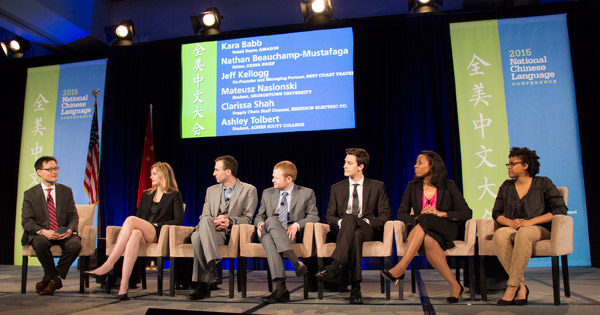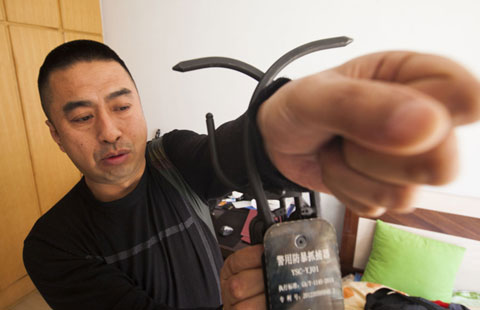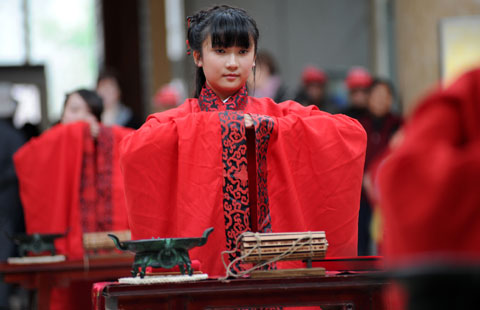Learning Chinese changes young lives
Updated: 2015-04-20 04:42
By DONG LESHUO and MAY ZHOU in Atlanta(China Daily USA)
|
||||||||
 |
|
From left, Jeff Wang, director of China learning initiatives at Asia Society, moderates the talk on Chinese learning experiences by panelists Kara Babb, Nathan Bueachamp-Mustafaga, Jeff Kellogg, Maeusz Naslonski, Clarissa Shah and Ashley Tolbert on Apr 17 in Atlanta. MAY ZHOU / CHINA DAILY |
American young people shared their experiences of Chinese learning at the 8th National Chinese Language Conference on April 17 in Atlanta.
"This conference is designed to demonstrate how language learning can provide multiple ways of global engagement, how language learning leads ordinary students to amazing careers and lives," said Jeff Wang, director of China Learning initiatives of the Asia Society.
Nathan Beauchamp-Mustafaga of Washington, DC made up his mind to learn Chinese as a foreign language over other languages when he was 12.
Now Beauchamp-Mustafaga is the editor of China Brief. He was selected as one of the Under 25 top rising scholars on US-China relations by Yale University's China Hands magazine.
"Chinese has given me passion. It is very fundamental part of my life," he said.
Kara Babb, who works for Amazon in Seattle, has been learning Chinese for five years.
Babb's major in college is international business. When her professor suggested she learn Chinese as a foreign language, she thought it was a mission impossible.
"I thought it was pretty difficult. When I look at the characters for the first time I thought I can't do this," Babb said.
However, by working hard and keeping at it every day, she now speaks fluent Mandarin.
"What Chinese is for me is giving me confidence that there is nothing I can't do," Babb said. "It's this kind of attitude that got me a job at Amazon that I had no experience for. Learning Chinese helped build my confidence. "
Mateusz Naslonski heard Chinese for the first time watching the movie Rush Hour as a freshman in high school.
"I thought it was really cool pronunciation," he said. Then he started his journey with learning Chinese, which opened the door to his future. As a sophomore at Georgetown, he decided, besides majoring in Chinese, he would also learn Korean. "I want to compare different East Asian cultures to gain better understanding of Asia."
Attorney Clarissa Shah experienced frustration in the very beginning, as her parents did not agree with her when she decided to learn Chinese in college.
"But I insisted on learning Chinese and my parents are very happy with what I have achieved now," Shah said.
Shah found out that speaking the language was really helpful to "engage in genuine conversations".
Jeff Kellogg, who has been learning Chinese for nine years, "wasn't thinking of continuing to learn Chinese from the start".
Now Kellogg has been using his Chinese skill to grow his own travel business. "I want Chinese visitors to the US to be moved by their experiences here as I was in China," said Kellogg.
The panelists also shared some personal insights. For Beauchamp-Mustafaga, "my best moments would be Christmas spent on Everest and my visits to Tibet and Xinjiang. When one gets outside of major cities like Beijing and Shanghai and explores further, one gets a sense of the fuller picture of China."
"In 2013 I lived in China for a few months. It was a cool and eye-opening experience," said Ashley Tolbert, whose Chinese name is Aisha.
"One time I volunteered at a rural school outside of Beijing, I was talking to people there about the difference in education between urban and rural areas. The fact that I could carry a meaningful conversation in Chinese blew my mind away," said Tolbert.
Naslonski thinks that studying Chinese is a process that takes time. He thinks Chinese grammar is difficult.
"Tone is one thing, intonation, pronunciation, is hard," said Kellogg. "But you shouldn't be discouraged by this. It's truly possible."
"Chinese is difficult but if you are excited about it and continue to keep that drive, it is not a hard as you thought," Shah said.
The panelists were all grateful to their teachers.
"It was encouragement from my Chinese teacher that made things easier," Beauchamp-Mustafaga said.
"I want to thank my Chinese teacher, Heidi Steele. She is so persistent that she will not give up on you," Kellogg said.
Naslonski described his Chinese teacher as "an excellent educator". "She is my friend. I can go straight into her office anytime," he said.
Moderator Jeff Wang pointed out that all the participants showed curiosity, passion and gained confidence and friendship along the way in learning Chinese. "This is what we called global engagement," said Wang.

 Shanghai auto show kicks off
Shanghai auto show kicks off
 Annual Tweed Run held in central London
Annual Tweed Run held in central London
 Wood sculptures discovered inside cliffside cave in Chongqing
Wood sculptures discovered inside cliffside cave in Chongqing
 Antiriot device earns national patent for Jilin farmer
Antiriot device earns national patent for Jilin farmer
 7 trends that will shape China's supply chain
7 trends that will shape China's supply chain
 Girls celebrate adulthood in NW China
Girls celebrate adulthood in NW China
 Couple linked by a stick
Couple linked by a stick
 Natural History Museum opens in Shanghai
Natural History Museum opens in Shanghai
Most Viewed
Editor's Picks

|

|

|

|

|

|
Today's Top News
AIIB looks to be efficient and 'green'
Bridging cultures with laughter
and song
Central bank cuts ratio for reserves
China's real estate market is a key global contributor: Conference
Envoy: Many benefits to Xi's visit
China concerned at reports of New Zealand-US plan to spy on diplomats
Old Summer Palace may sue over controversial replica
China and the 2016
US election
US Weekly

|

|







